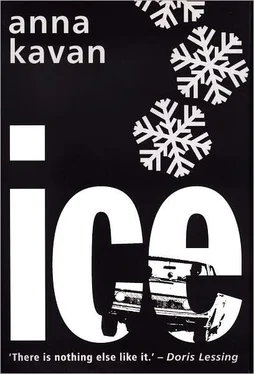Slowly she turned her head towards me without a word; her mouth appeared out of the shining hair, then her wet brilliant eyes, glittering between long lashes. Now she had stopped crying; but at intervals a shudder, a soundless gasp, interrupted her breathing, like an interior sob. She did not say anything. I waited. The seconds passed. When I could not wait any longer, I asked softly: ‘Are you coming with me? I promise I won’t bully you any more.’ She did not answer, so after a moment, I was obliged to add: ‘Or do you want me to go?’ Abruptly she sat up straight, made a distraught movement, but still did not speak. I waited again: tentatively held out my hands; lived through another long silence, interminable suspense. At last she gave me her hands. I kissed them, kissed her hair, lifted her off the bed.
While she was getting ready I stood at the window, staring out at the snow. I was wondering whether I ought to tell her that I had seen the sinister ice-wall approaching across the sea, and that in the end it was bound to destroy us and every thing else. But my thoughts were muddled and inconclusive and I reached no decision.
She said she was ready, and went to the door; stopped there looking back at the room. I saw her psychologically-bruised face, her extreme vulnerability, her unspoken fears. This little room the one friendly familiar place. Everything outside terrifyingly strange. The huge alien night, the snow, the destroying cold, the menacing unknown future. Her eyes turned to me, searched my face: a heavy, doubting, reproachful look, accusing and questioning at the same time. I was another very disturbing factor; she had absolutely no reason to trust me. I smiled at her, touched her hand. Her lips moved slightly in what, in different circumstances, might have become a smile.
We went out together into the onslaught of snow, fled through the swirling white like escaping ghosts. With no light but the snow’s faint phosphorescent gleam, it was hard to keep to the path. Even with the wind behind us, walking was hard labour. The distance to the car seemed much greater than I had thought. I held her arm to guide her and help her along When she stumbled I put my arm round her, steadied her held her up. Under the thick loden coat she was cold as ice her hands felt frozen through my heavy gloves. I tried to rub some warmth into them, for a moment she leaned on me, her face a moonstone, luminous in the dark, her lashes tipped white with snow. She was tired, I sensed the effort she made to start walking again. I encouraged her, praised her, kept my arm round her waist, picked her up and carried her the last part of the way.
When we were in the car, I switched on the heater before doing anything else. The interior was warm in less than minute, but she did not relax, sat beside me silent and tense. Catching a sidelong suspicious glance, I felt myself justly accused. After the way I had treated her, suspicion was all I deserved. She could not know that I had just discovered a new pleasure in tenderness. I asked if she was hungry; she shook her head. I produced some chocolate from the food parcel, offered it to her. No chocolate had been available for civilians for a very long time. I remembered she used to like his particular brand. She looked at it doubtfully, seemed about to refuse, then relaxed suddenly, took it, thanked me with a timid and touching smile. I wondered why I had waited to long to be kind to her, until it was almost too late. I said nothing about our ultimate fate, or about the ice-wall coming nearer and nearer. Instead, I told her the ice would stop moving before it reached the equator; that we would find a place here where we would be safe. I did not think this was remotely possible, did not know whether she believed it. However the end came, we should be together; I could at least make it quick and easy for her.
Driving the big car through the glacial night I was almost happy. I did not regret that other world I had longed for and lost. My world was now ending in snow and ice, there was nothing else left. Human life was over, the astronauts underground, buried by tons of ice, the scientists wiped out by their own disaster. I felt exhilarated because we two were alive, racing through the blizzard together.
It was getting more and more difficult to see out. As fast as the frost-flowers were cleared from the windscreen they reformed in more opaque patterns, until I could see nothing through them but falling snow; an infinity of snowflakes like ghostly birds, incessantly swooping past from nowhere to nowhere.
The world seemed to have come to an end already. It did not matter. The car had become our world; a small, bright heated room; our home in the vast, indifferent, freezing universe. To preserve the warmth generated by our bodies we kept close to each other. She no longer seemed tense or suspicious, leaning against my shoulder.
A terrible cold world of ice and death had replaced the living world we had always known. Outside there was only the deadly cold, the frozen vacuum of an ice age, life reduced to mineral crystals; but here, in our lighted room, we were safe and warm. I looked into her face, it was smiling, untroubled I could see no fear, no sadness there now. She smiled and pressed close, content with me in our home.
I drove at great speed, as if escaping, pretending we could escape. Although I knew there was no escape from the ice, from the ever-diminishing remnant of time that encapsuled us. I made the most of the minutes. The miles and the minute flew past. The weight of the gun in my pocket was reassuring.
Anna Kavan, née Helen Woods, was born in Cannes — probably in 1901; she was, at best, evasive about the facts of her life — and spent her childhood in Europe, the United States and Great Britain. Her life was haunted by her rich, glamorous mother, beside whom her father remains an indistinct figure. Twice married and divorced, she began writing while living with her first husband in Burma and was initially published under her married name of Helen Ferguson. Her early writing consisted of somewhat eccentric ‘Home Counties’ novels, but everything changed after her second marriage collapsed. In the wake of this, she suffered the first of many nervous breakdowns and was confined to a clinic in Switzerland. She emerged from her incarceration with a new name — Anna Kavan, the protagonist of her 1930 novel Let Me Alone — an outwardly different persona and a new literary style. She suffered periodic bouts of mental illness and long-term drug addiction — she had become addicted to heroin in the 1920s and continued to use it throughout her life — and these facets of her life feature prominently in her work. She destroyed almost all of her personal correspondence and most of her diaries, therefore ensuring that she achieved her ambition to become ‘one of the world’s best-kept secrets’. She died in 1968 of heart failure, soon after the publication of her most celebrated work, the novel Ice.
PETER OWEN PUBLISHERS
© Anna Kavan 1967 © Estate of Anna Kavan and Peter Owen Ltd 1968
First published in Great Britain 1967
Reprinted 1997
This edition first published 2006
Reprinted 2011
Foreword © Christopher Priest 2006
ISBN 978-0-7206-1268-4












